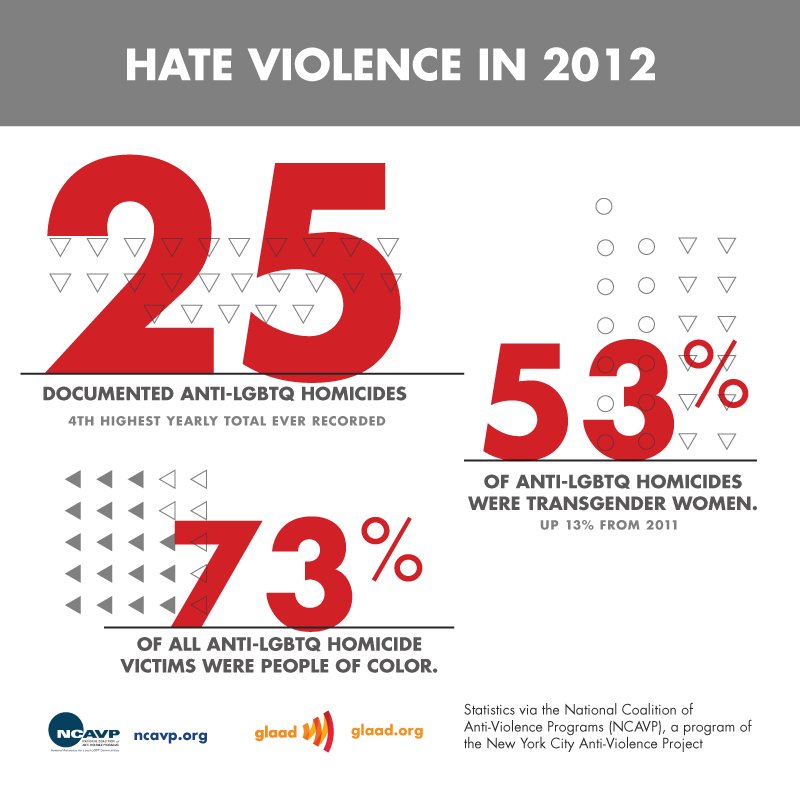As visibility grows, trans people face increasing violence
Gallery

The struggle for LGBT rights and visibility has seen several successes over the years. Same-sex marriage is now legal in this country; many cities have gay pride parades and television and movies increasingly contain well-written depictions of LGBT people. However, there are still a number of areas of LGBT life that remain underserved and underreported. One unfortunate such area is the rising violence facing the transgender community, particularly that directed against transwomen of color.
The transgender community is poorly understood by mainstream society. Even well-meaning individuals will commit such offenses as misgendering or deadnaming someone, that is to say, referring to someone as being other than their identified gender or referring to them by their birth name, respectively. Trans people face discrimination and ostracization at all levels of their lives, from their families to their employers to even the queer community itself. This often leads trans people to become isolated, with a disproportionate number of them forced into homelessness and prostitution, making them all the more vulnerable to violence.
Trans people are disproportionately affected by violent crimes to a disturbing degree. Many members of the community face violence for merely living their lives openly. The National Coalition of Anti-Violence Programs first began tracking the murder of trans people in 2010, and the average murder rate has steadily increased ever since. Twenty-seven trans people were murdered in 2016, and according to Unerased, a project initiated by Mic to track trans murders, the murder rate among young transwomen of color in 2015 was 1 in 2,600. To put this number in perspective, Unerased reveals that if this were the national murder rate for 2015, the U.S. would have seen 120,087 murders instead of the 15,696 the FBI reported for that year.
Of the 27 murders in 2016, three occurred in the Palmer Park neighborhood of Detroit. Formerly Detroit’s “gayborhood,” Palmer Park became rapidly less gay and less safe as its population fled north of 8 Mile during the late ‘80s and early ‘90s. Despite this, the neighborhood is still something of a gathering ground for the local queer community, a fact used to prey upon the transwomen of the area.
This year is on track to equal, or even exceed the numbers recorded in 2016, with seven trans murders having occurred so far. Two of the murders were committed in New Orleans within 48 hours of each other, though police do not believe they were connected by anything other than the gender identity of the victims. The last week of February alone saw four trans murders. A friend of Ciara McElveen, who was stabbed to death in New Orleans on Feb. 27, told Dan Avery of NewNowNext, “We should have the right to live our lives open and free and not be taunted and traumatized by the general public.”
The tragedy of trans murders is often compounded after their death. As many of these people lack the support of their families, their bodies are sometimes unclaimed. In other instances, their families refuse to respect their identity, even in death, and have them buried under their birth name and the gender assigned to them at birth. These actions are particularly hurtful to the friends of the deceased, who feel that the victim was not only murdered, but had their identity erased. As Laverne Cox, best known for playing trans inmate Sophia on “Orange is the New Black,” said in an Instagram post commemorating Transgender Day of Visibility on March 31, “We acknowledge that when trans folks are misgendered and disavowed this is yet another attempt to stigmatize and erase us.”
This increase in anti-trans violence comes as part of a larger backlash against increasing trans visibility. In state legislatures across the country, perhaps most famously in South Carolina, Republicans have fought to prevent trans people from using the bathroom that matches their gender identity. Advocates and activists, including such voices as Laverne Cox and Janet Mock, have increasingly made it known that they will continue to fight for both trans visibility and trans safety. In a statement released by the NCAVP manager Emily Waters said, “As we face an administration which devalues the safety and rights of transgender people and people of color, we must work tirelessly to support transgender friends, family, and community members.”
